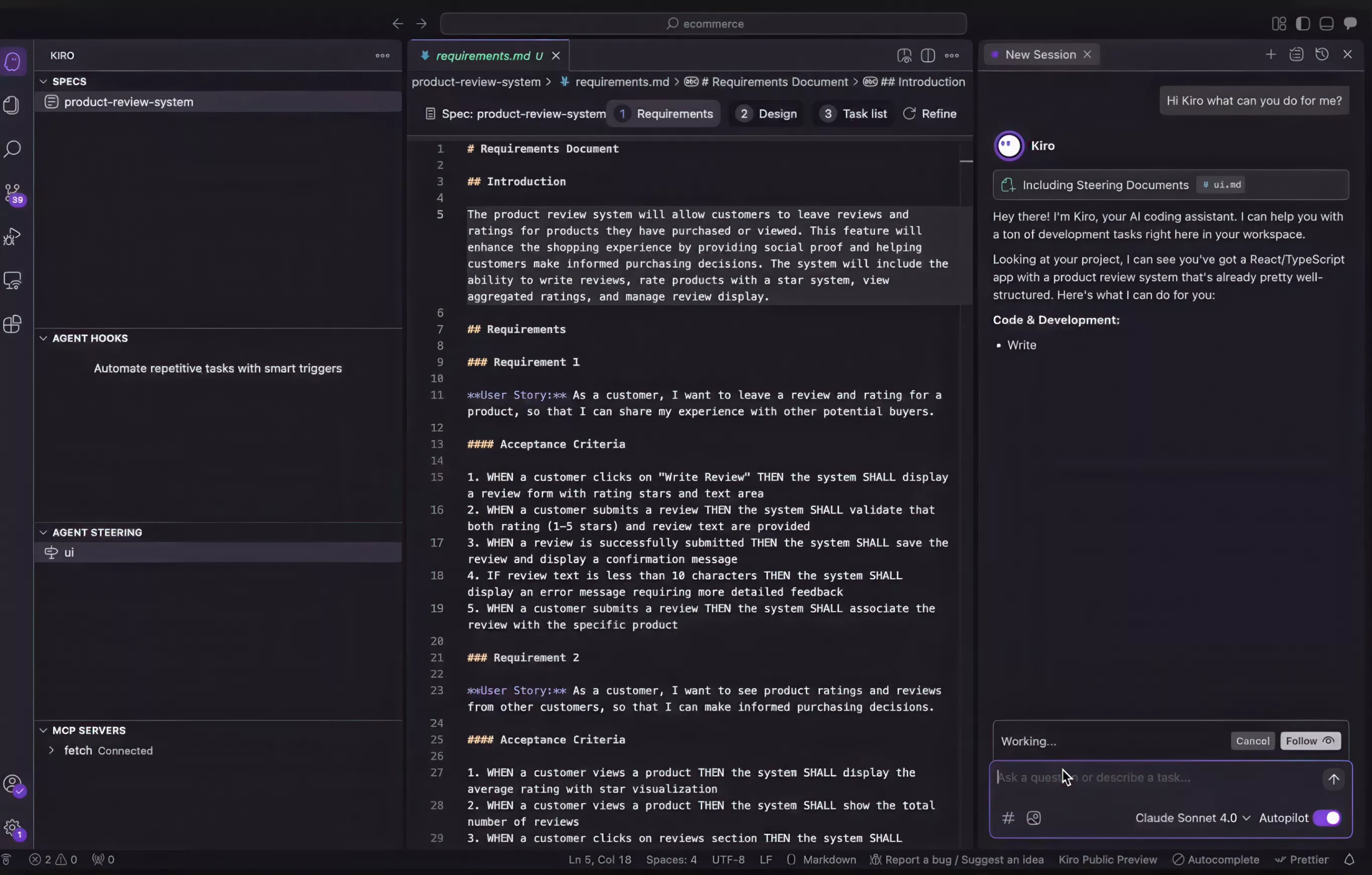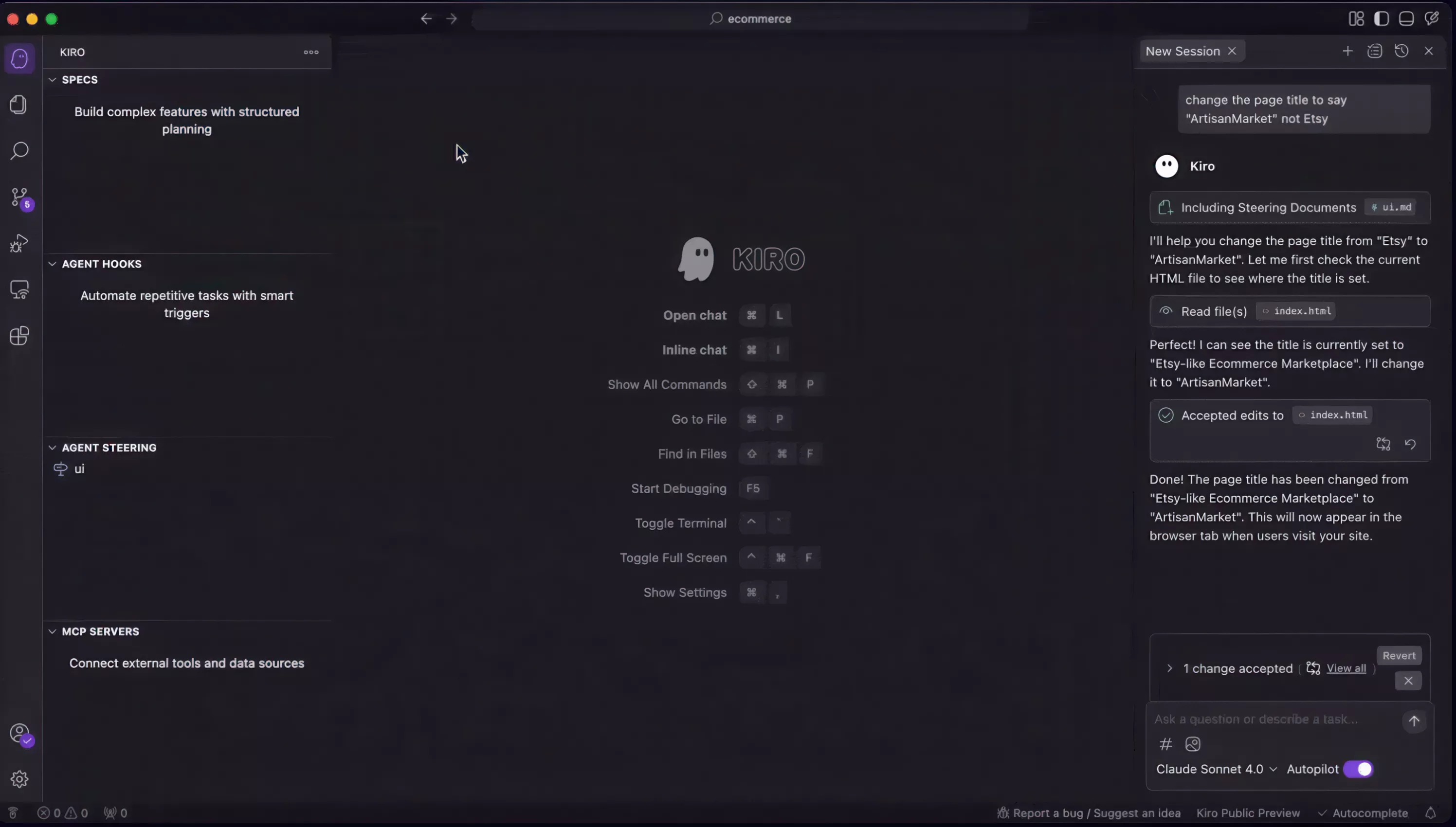Kiro is an agentic IDE that helps you go from prototype to production with spec-driven development. From simple to complex tasks, Kiro works alongside you to turn prompts into detailed specs, then into working code, docs, and tests-so what you build is exactly what you want and ready to share with your team.
Kiro's agents help you solve challenging problems and automate tasks like generating documentation and unit tests. With Kiro, you can build beyond prototypes while being in the driver's seat every step of the way.
What is spec-driven development? How is it different from vibe coding?
Developing with specs keeps the fun of vibe coding, but fixes some of its limitations: vibe coding can require too much guidance on complex tasks or when building on top of large codebases, and it can misinterpret context. When implementing a task with vibe coding, it's difficult to keep track of all the decisions that were made along the way, and document them for your team. By using specs, Kiro works alongside you to define requirements, system design, and tasks to be implemented before writing any code. This approach explicitly documents the reasoning and implementation decisions, so Kiro can implement more complex tasks in fewer shots.
What programming languages does Kiro support?
Kiro supports a variety of programming languages that developers use in their day to day work. This list includes, but is not limited to Python, Java, JavaScript, TypeScript, C#, Go, Rust, PHP, Ruby, Kotlin, C, C++, shell scripting, SQL, Scala, JSON, YAML, and HCL.
Can I import settings from my existing IDE?
Kiro is based on Code OSS, so you can import your VS Code settings, themes, and Open VSX compatible plugins in the Kiro onboarding flow.
Is Kiro free to use?
Kiro is free to use during its preview period, with limited access that allows you to explore the product without interruption. A paid subscription will be required once the preview ends.
What are the best free alternatives to Kiro?
Cursor offers a free tier with core AI features and usage limits. It's a modified version of VS Code that integrates AI pair programming using models like GPT-4. Features include code suggestions, refactoring tools, debugging assistance, and inline chat.
Features
Specs
Kiro specs are artifacts that prove useful anytime you need to think through a feature in-depth, refactor work that needs upfront planning, or when you want to understand the behavior of systems-in short, most things you need to get to production. Requirements are usually uncertain when you start building, which is why developers use specs for planning and clarity. Specs can guide AI agents to a better implementation in the same way.
Hooks
Kiro hooks act like an experienced developer catching things you miss or completing boilerplate tasks in the background as you work. These event-driven automations trigger an agent to execute a task in the background when you save, create, delete files, or on a manual trigger.
Steering
Steering gives Kiro persistent knowledge about your project through markdown files in .kiro/steering/. Instead of explaining your conventions in every chat, steering files ensure Kiro consistently follows your established patterns, libraries, and standards.
Agentic chat
Kiro offers a chat panel where you can interact with your code through natural language conversations. Just tell Kiro what you need. Ask questions about your codebase, request explanations for complex logic, generate new features, debug tricky issues, and automate repetitive tasks-all while Kiro maintains complete context of your project.
MCP
Model Context Protocol (MCP) extends Kiro's capabilities by connecting to specialized servers that provide additional tools and context. This guide helps you set up, configure, and use MCP servers with Kiro. MCP is a protocol that allows Kiro to communicate with external servers to access specialized tools and information. For example, the AWS Documentation MCP server provides tools to search, read, and get recommendations from AWS documentation directly within Kiro.



